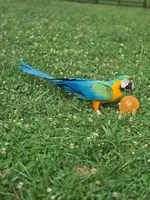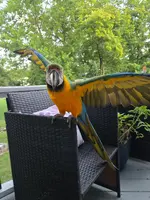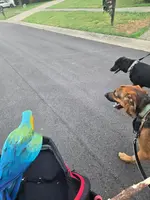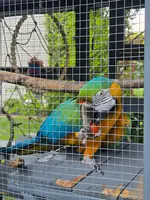Aaralynn8075
Member
- Dec 30, 2024
- 16
- 33
- Parrots
- Ozzie - Macaw
I am hoping someone can help give us some ideas to help our 20yr old Harlequin rescue.
Last year, we rescued a Harlequin Macaw. He was given to the rescue due to aggression. He was adopted and returned to the same rescue 3 separate times due to aggression. My family and I were determined to help him...so we adopted him.
We recognize that he will never be a cuddly bird, but we would like to curb some of his aggression if possible. To be clear, I am not talking small nips, I have ended up in the hospital and have scars to boot, along with my husband. This is our first macaw and we have spent the past year working on our bond. We now would like to see if we can help the aggression.
A little about his care - He is caged about 15% of the day. Other than that, he is either in his backyard aviary or free roaming in the house. He has his main diet as well as a daily mixed 'treat' bowl with fresh fruits, nuts in the shell, veggies, etc. I eat breakfast with him (usually some Heathy fruit cereal or fruit) to bond and we walk him in his stroller each night. He gets plenty of attention.
We do not allow him on our skin at any point in time - we use sticks which he is fantastic at stepping up on. The thing is, given the chance he will switch in a second and latch on and not let go. He may lunge and grab your stomach as you walk by a chair, try to tear a tendon in your ankle if you're sitting on the coach, or go straight to taking off a finger tip if you try to give him a snack. 98% of the time, you can do the same action with zero incident....but that 2%, that 100th Cheezit, well - he just goes for the kill.
I do not know his background. I DO know he is 100% against stick training and clickers (one of my hospital visits). Any ideas for helping? We would love to have a more harmonious and trusting relationship. It is really hard to not be a little uneasy when every few months, he reminds us that his beak is big and sharp.
Last year, we rescued a Harlequin Macaw. He was given to the rescue due to aggression. He was adopted and returned to the same rescue 3 separate times due to aggression. My family and I were determined to help him...so we adopted him.
We recognize that he will never be a cuddly bird, but we would like to curb some of his aggression if possible. To be clear, I am not talking small nips, I have ended up in the hospital and have scars to boot, along with my husband. This is our first macaw and we have spent the past year working on our bond. We now would like to see if we can help the aggression.
A little about his care - He is caged about 15% of the day. Other than that, he is either in his backyard aviary or free roaming in the house. He has his main diet as well as a daily mixed 'treat' bowl with fresh fruits, nuts in the shell, veggies, etc. I eat breakfast with him (usually some Heathy fruit cereal or fruit) to bond and we walk him in his stroller each night. He gets plenty of attention.
We do not allow him on our skin at any point in time - we use sticks which he is fantastic at stepping up on. The thing is, given the chance he will switch in a second and latch on and not let go. He may lunge and grab your stomach as you walk by a chair, try to tear a tendon in your ankle if you're sitting on the coach, or go straight to taking off a finger tip if you try to give him a snack. 98% of the time, you can do the same action with zero incident....but that 2%, that 100th Cheezit, well - he just goes for the kill.
I do not know his background. I DO know he is 100% against stick training and clickers (one of my hospital visits). Any ideas for helping? We would love to have a more harmonious and trusting relationship. It is really hard to not be a little uneasy when every few months, he reminds us that his beak is big and sharp.




